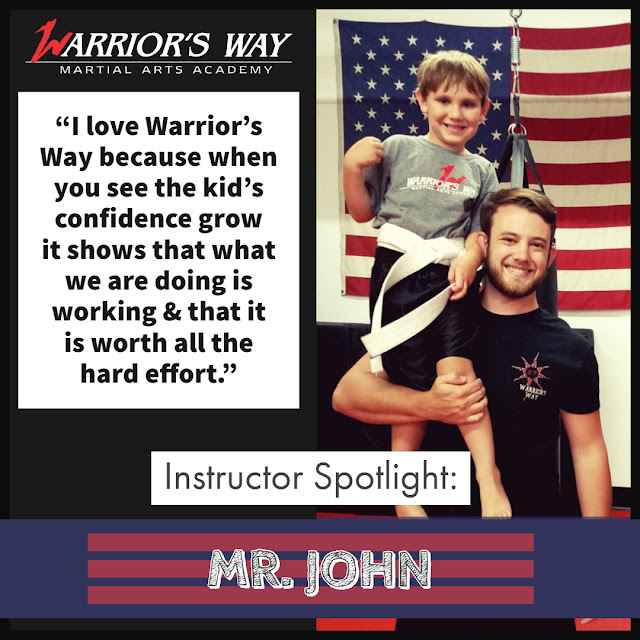I was watching a video the other day titled the Greatest Lesson for Parents. As someone who prides themselves in raising warriors and helping parents achieve this goal I was intrigued. In this video a well spoken woman was advocating for loving children and the celebration of being ordinary. At first glance, this video seemed a sentimental thought that I could get behind, but the more I thought about it, the more I realized I fundamentally disagreed with her message. I mean yes, we should always love and celebrate our child in each stage of life. And no matter what they choose to do or be nothing can change that parental bond, that desire to be their cheerleader and encourage them. But one thing she said struck me as inherently wrong. I will love my children even if they are ordinary, but just because that is a fact doesn't mean I am willing to settle for that. I am not going to let my child be comfortable identifying as mundane or average. I am going to push them until they are their best self. And the truth is I have an obligation as a good parent to do so.
Children are in a continual stage of learning and growth. They will not bathe regularly, eat healthy meals, or go to school unless we make them. So in answer to how far can a child go? That truly depends on us, their parents. We have to push our children consistently, we have to show them the way over and over again. That is the ONLY way for them to achieve their full potential. And this isn't a lesson they master by age 5 or 6. This is a lifetime journey and commitment for us as parents.

With that being said why should you push your child to not quit sports, master an instrument, shoot for valedictorian, or become a Junior Black Belt? Why should we not settle for ordinary and push them on towards extraordinary? We've said before you don't get diamonds without a little pressure and the truth is children are the same way. So here are some reasons to push your child to be a Junior Black Belt, even though it is hard, intimidating, and a huge commitment.
Rite of Passage:
Society has stepped away from rites of passage. It used to be the norm. A giant push that showed you were maturing and stepping away from the comforts of childhood. Now so few get to experience that emotional test of one's determination and heart. And today we live in a very competitive world. As parents, it is our job to help our children see that no matter the obstacle they can overcome. Working for and then testing for their Junior Black Belt shows a child they can go beyond what they initially thought was achievable. It is a rite of passage that shows them horizons can always be reached and broadened. And those lessons and that new found belief and pride in self is priceless in a competitive society. It forever changes them for the better.
Investment:
Martial arts is more than another sports activity. It is an investment in healthier habits, our child's safety, and their future. We live in a dangerous world. It is sad, but true. You teach a child to swim not because you have an incessant fear of drowning, but because it is a useful skill set, makes them more capable, and so they can protect themselves if needed. Self defense goes the same way. A Black Belt does not guarantee they won't be bullied or picked on, but it gives them another skill set and a tool that they can utilize if needed. And it goes so far beyond that. Instilling healthy habits of exercise, discipline, hard work, and goal setting prepares your child for the road ahead. It truly is an investment in the quality of their character. And that alone is worth the work of encouraging your child to persevere, making them go to class when they don't want to, and working with them outside of class on that vocabulary and running.
Confidence:
Martial arts is hard. Testing in front of a panel is intimidating. You finally master something and the bar is raised even higher. You're learning to be in healthy competition with your own worst enemy... yourself. Martial arts teaches you how to grow through wins and to handle life's frequent set backs. That first spin kick will have them land flat on their back. But that is okay, because they are learning that nothing can truly knock them down so long as they keep getting back up. There is a huge focus on leadership in class. You have to be prepared to be pulled up unexpectedly to demonstrate in front of the whole class, or having to assist your class mates with material they haven't quite mastered. All of this works together to foster a sense of capability and confidence in the face of trials. And this is such an important lesson to master before they leave the safety of our homes. Confidence is one of those things that can make or break you in the professional world, and Black Belts have that.
Discipline:
Outside of school and some extracurriculars kids don't really have to sacrifice or prioritize their time. Free time is theirs to do whatever they wish with. And while school and other activities does require a modicum of discipline it is completely guided up through high school and due to an avoidance of unwanted consequences. To test for Jr Black Belt you have to do some work outside of class. You have to run, work on your push ups, study history, learn vocabulary, and attend as many classes as possible. This requires sacrifice. To play video games and watch Netflix or to take some time and study. To get ready to test requires self discipline. And self discipline is how we create good habits, set goals, crush them, and become successful. Because once a child has left the safety of home, no one will push them to do what is needed, it will be entirely up to them.
So how far can a child go?
The answer is all the way!!!
...IF you are willing to help and guide them. A Junior Black Belt test is a rite of passage. It is so much more than just another belt. It's a raising of the bar and expectations. It is a test of skill, knowledge, and more importantly heart. It's being forced to push through hard days with the never ending goal of becoming more than they were yesterday. And it is a journey they cannot make alone. Because behind every Black Belt student there is a black belt parent who signed them up, pushed them, cheered for them, and didn't ever let them give up. So no matter where you and your Warrior are in your martial arts journey we are grateful for you and honored that you trust us to help them become the amazing young men and women we know they are going to be!
#RaiseAWarrior





























